The indefatigable Anil Kapoor talks about his endless energy, refusing Chandni because he had to sit in a wheelchair, feeling gutted that he didn't do more endorsements and, of course, the Mr. India sequel!
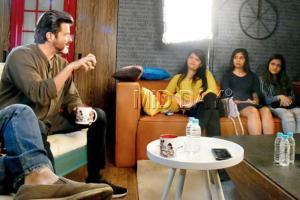
Anil Kapoor regales the audience at the latest edition of Sit with Hitlist. Pics/Rane Ashish, Nimesh Dave
Suzie, we're told, is a popular, heavily priced cocaine doing the rounds of Juhu - the effects of which include indefatigable energy levels that last you for every second that you're up and still snorting. The high seems natural. The party never stops, and life seems positive, and happy, and fun, all the time. Which is pretty much the state that has defined the public profile of actor-superstar Anil Kapoor, 61, for decades that he's entertained millions at a stretch. And continues to. What keeps him going? He hasn't tried Suzie, he tells us. Well, just for fun, we checked:
Have you ever done drugs?
I've had hash - ganja. Nahi, charas bolte hain. This was when I was in college, just finished school. Once I had hash, a few times, actually. I've had grass [ganja/marijuana] also. That's it.
But those are [usually] downers. You're on a constant upper!
To be honest, because they were downers, I didn't like them - they made me feel low, sleepy. I said I don't need this.
Were you much of a drinker though?
I've had beers, and [other] drinks; but never done anything excessive.
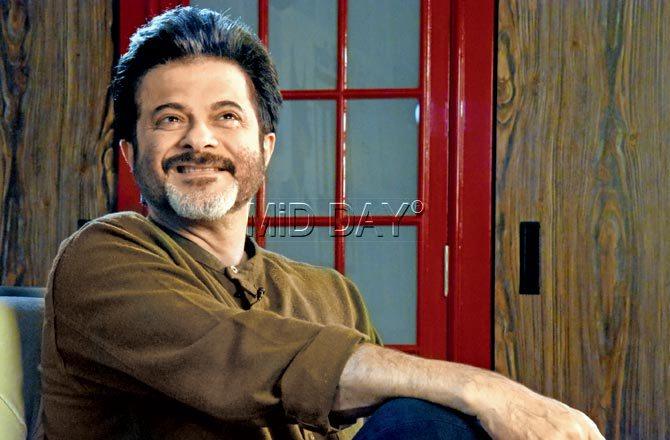
Anil Kapoor
I'm only trying to get at what drives you (and if there's an external substance that we could recommend to readers!).
This is the way I naturally am. It's just the profession, the whole entertainment business, or show-business - cameras, films, ADs, working with the director, writers, actors, actresses, producers; interacting with media, doing different roles… Everything surrounding me makes me feel positive, gives me energy. It's exciting, pulsating, also edgy - because you're not sure what's going to happen. You're insecure. You do your best; feel it's not the best. But people say it is! I'm just so happy that I don't do a 9-to-5 desk-job.
Which you never have.
Never. I can sit down for half-hour, or an hour; not longer. I have to be standing, walking, running; or sleeping, so that I'm fresh again!
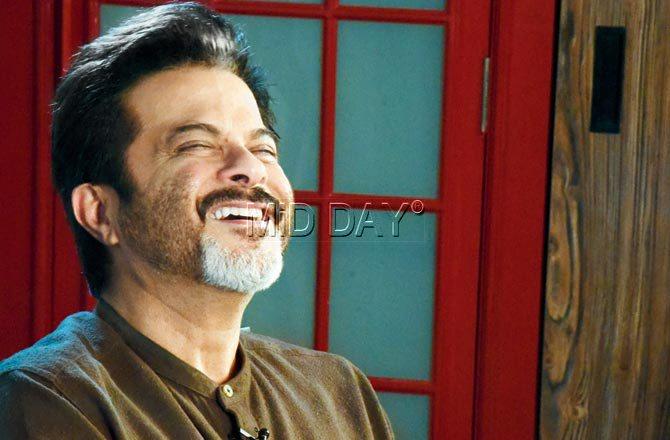
Anil Kapoor
And you've been working like this for 40 years?
I think so. I [recently] called up my producer-director Umesh Mehra to ask, "When did we start the film [Humare Tumhare]?" It released in 1979. Think we would have started [shoot] two years before. So, if I started my acting career in '77, it's been 40 years [plus]. He [Mehra] is also trying to find out exactly which date we started. The film had Sanjeev Kumar, Rakhee. There were 10-12 children in it. I was one of them.
Was that the one where you played the young Shashi Kapoor?
No, that was in 1973 [for the shelved film Tu Payal Mein Sangeet]. I was in the seventh standard. That was the first time I faced the camera, but only as a child actor. By Humare Tumhare, I had done my acting course. And then I did [MS] Sathyu's Kahan Kahan Se Guzar Gaya [1981], [Lekh Tandon's] Ek Baar Kaho [1980]...
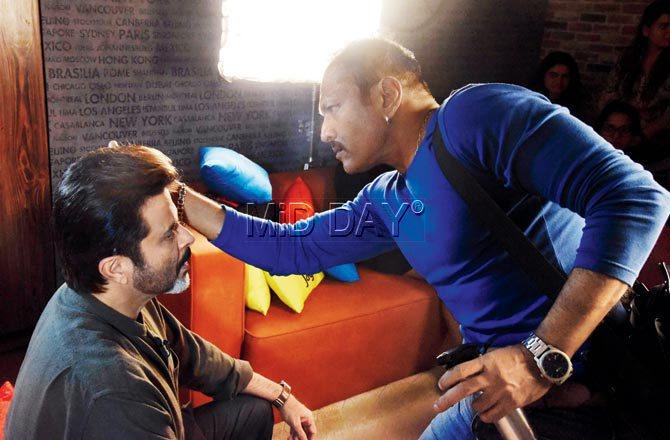
Anil Kapoor's makeup man gets him ready before the chat
A lot of people don't know that you were also the lead in Mani Ratnam's directorial debut.
Pallavi Anu Pallavi [1983; in Kannada], yes, his first film. Balu Mahendra was the cameraman, the visuals were stunning. I was in Bangalore recently, and people still remember the film. Ilaiyaraaja's music in it had become very popular.
All of this before Woh 7 Din (where you first got majorly noticed).
Yes, I started working on Woh 7 Din in 1982. I was not getting any work in Mumbai as an actor - besides bit roles. I thought I was cut out for bigger things. So I said, let me start helping out my brother [Boney] with production in Chennai. He was taking over dad's work in Hum Paanch. Being the eldest, he was looking after finance, while I did all the odd jobs. I would also stand-in for actors while the scenes were being set up. Bapu saab was the director. I would show him how good I could give a shot. He would observe. That's when he offered me the Telugu film [Vamsa Vruksham]. And then he directed my first [Hindi] film [as lead], Woh 7 Din, with the script written by K Bhagyaraj.
Your early stories are actually all about astounding persistence. You could stand around [hoping to get noticed] for hours (at a stretch).
Yes, I've stood behind the camera on Subhash Ghai's sets a lot, hoping, "Abhi dekhega shayad," and that as soon as his [Ghai's] eyes meet [mine], I'll go, and meet him. Then I'd get to know that he's at Holiday Inn. So I would stand in the lobby. Then I'd think, "Why lobby? Let me just go up." So then I would be there in the corridor. I wouldn't have the guts to go and chat with him though. I've sat around at Rajshri Productions office [in Prabhadevi] a lot. It was very tough to meet the Barjatyas, so I became friendly with the production guys - Mr Gupta, Mr Zaki... Suddenly Gupta tells me Zaki wants to make a film. I say, why not cast me? Before I could meet the Barjatyas, the production guy was making a film called Prerna with me, which got stuck. But, I was the leading man. Likewise, while I was trying to meet Subhash Ghai, one of his assistants, Kukoo Khanna, Usha Khanna's brother, pointed me towards a small film. So I sat in David Dhawan's Vespa, went over, and signed up for a film called Rachna, which ran for one-day, one-show, in the theatre!
Did you have a Plan B?
After about four or five years, I did think of a Plan B, but, in films - like writing scripts, or doing anything else to be in the films.
Well, you are from a film family; if I'm not mistaken your father was an AD on Mughal-e-Azam. He also managed Geeta Dutt's work, thereafter Shammi Kapoor's.
He was a very honest, decent, introverted kind of good man - not one of those pushy, aggressive, filmy ones. And he once clearly told me that he cannot do anything for me. I never expected him to either. From that day, I felt, instinctively, it's time for me to go out into the battlefield, and fight.
If the battlefield means sitting around hoping for someone to notice you, it would get quite tiring, right?
It was exhausting, frustrating. I looked and felt my worst in those days - sitting with friends having rum.
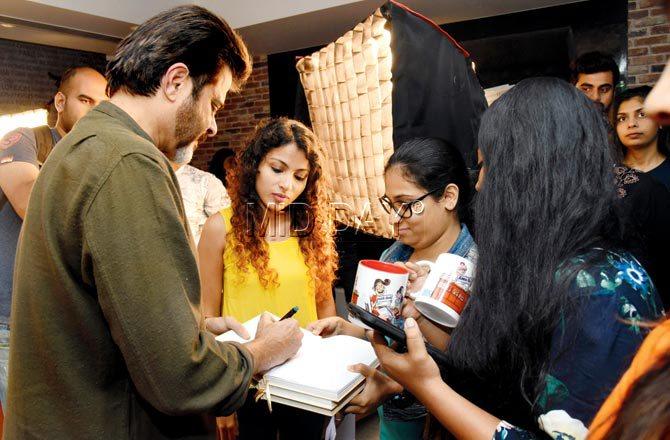
The actor obliges his fans with autographs
Could you channel that eventually in your work; a film like Awaargi [1990], for instance?
Yes, [Mahesh Bhatt's] Awaargi, and even before that, [Subhash Ghai's] Mashaal. Then there was [Bhatt's] Thikana, where I play an alcoholic. This is when Mahesh Bhatt was trying to find himself; it was a pleasure and fun working with him. Both Awaargi and Thikana turned out to be disasters though.
But you basically ended up with a 40-plus years' career, without a sabbatical. Ever thought of taking one?
I did, once. I spoke to Amit ji [Amitabh Bachchan], while we were shooting for Armaan [2003]. He had taken a break for five years. His advice was: Whatever you do, keep on working.
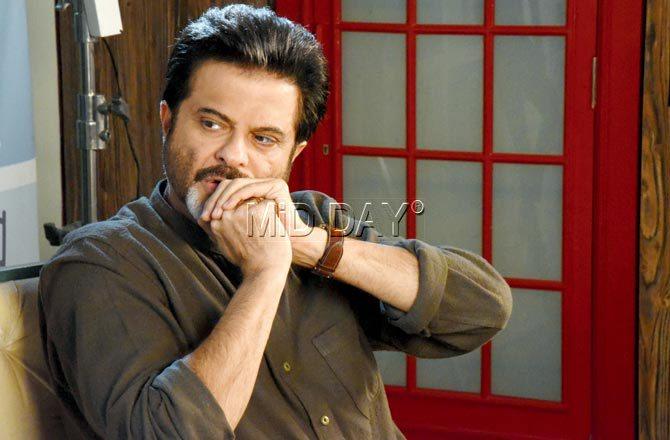
Anil Kapoor
Also, since you began in the '80s, which was all about over-the-top performances, that you cracked, to decades later, when the kind of films being made are vastly different, you would've had to constantly reinvent yourself too?
When I started my career, they used to tell me I'm an English actor. First they used to say, "Zara loud bol. Underline it. Punch de usko. Punch de!" I'd be like, 'What punch are you talking about? I'm just being myself, real. But the sound-recordist would tell me it doesn't work. That I had to start pitching - so you're not speaking, or making conversation. You're talking at them [the audience]. But, obviously, working with good directors, films becoming successful, you get the confidence. Initially, I was not that comfortable, to be honest with you.
You were not always the 'jhakaas' guy?
No, I was not. In fact at the time [of the release of Yudh, 1985], 'jhakaas' didn't become that popular. The film was an average success. They said that I was the best thing in it, and wished there was more of me. The film was more about Jackie [Shroff's character]. That 'jhakaas'; and my character stood out. People were talking about it. But I didn't take it seriously enough to cash in on it.
Would you say that 'jhakaas' image was more a Subhash Ghai creation; with a Ram-Lakhan [1989]: One two ka four, four to ka one stuff?
No, I did Tezaab [1988], before Ram Lakhan. And of course, I had done [Yash Chopra's] Mashaal [written by Javed Akhtar], where there was realism, and a star-quality [to the character] - a combination that you notice in Salim-Javed scripts. The foundation got laid in Mashaal [1984].
If we go back to your entire body of work, a lot of people would say Mr India was a perfect 10. Would you agree?
I feel the first half of Mr India was much more organic, human, beautiful. In the second half, I felt, there were certain portions that seemed really forced. You could say we did this to make it massy. The casting of the children, the scenes were picture-perfect, yes. The same was the case with Ram Lakhan. The first half was brilliant.
Lamhe [1991]?
Well, Lamhe, people liked the second half better. The first half, I found to be unnecessarily slow. A film must hold you from the beginning to the end. People say climax theek nahi tha. I feel it was ahead of its time. And Sridevi was magnificent in both Mr India and Lamhe. She was beyond perfect in Mr India. Or, for that matter, even Judaai, if you've see her in the film, she is exceptional.
Speaking of Sridevi, the tragedy earlier this year was heartbreaking. How did you deal with it?
It is one of the most unfortunate things to have ever happened. Every night, my wife and I talk about her. There's not a single day when we don't miss her. [Pause]
Going back to Lamhe, while it didn't do well in India, it actually opened up a whole diaspora market for Bollywood, isn't it?
Both [Yash Chopra's] Lamhe and [Vidhu Vinod Chopra's] 1942: A Love Story [1994] were game-changers [for me]. I signed both the films simultaneously. I'd had an accident, and was bedridden, nursing my leg, for two-and-half months. It was a turning point in my life. I was running fast, but going nowhere. I just wanted films, one after other - doing films that I didn't care much for.
You've spoken about how you've done a few films like an Andaaz or say Mr Azaad purely for the signing amount.
No, not the signing amount; for the whole thing - advance mein. But the past is past. Why should I say now, why I did them? But 1942 and Lamhe were the kind of exciting films that were not being made [back then]. Yashji wanted to do something post-Chandni, since it was a success.
And I hear you'd said no to Chandni. Why?
I had said no to Chandni, because I didn't want to sit in a wheelchair.
It would be hard to contain you in a wheelchair!
I was just not in a frame of mind to sit in a wheelchair through an entire film. I was, in fact, one of the first people to call Yashji and tell him, "Picture hit hai!" He couldn't believe it. I had done two films [Mashaal, Vijay] with him, and both hadn't done well.
So post-accident, you became more conscious of the scripts you'd pick up?
Conscious, yes; but I also started getting offered more films of the sort that I wanted to do. Certain films I did for the kitchen, family, children…
Do you have a clear distinction between a film for kitchen, and craft?
I do.
So when you do a Race 3, for instance...
There are other reasons as well. I have to like my role. And who is producing it, acting in it.
Going back to what makes you special, besides being around for 40 years; you're also a rare Bollywood superstar with a moustache. No?
No, there was Raj Kapoor, Charlie Chaplin, and Shatrughan Sinha.
Exactly, that's it. Did Manmohan Desai ever say that a man with a moustache can never be a hero?
I read it in an interview. He called me up after Eeshwar [1989], and said, "I thought you'd never become a star. You are just an actor." He said he wanted me to do his films. He had said Jackie Shroff is a star, and I am just an actor.
You've had a lot of such stuff thrown at you, isn't it?
I was lambasted, even when there was no social media. But I've always looked at the marathon, the longer run. I didn't go for the 100 metre dash. Well, I did in the '80s, and then I came back. Because the 100 metre dash is too tiring and exhausting. I knew I'd burn myself out.
And was doing television, with 24, probably a marathon thing to do?
Yes, it gave me a role away from the cinemas. And it wasn't the role of a reality-show judge. It gave me creative satisfaction, to work on a great story.
Did you also see LA as a longer-run thing to do? How serious were you about pursuing that as a career option?
Yes, it was a longer run thing: [looking at] legacy, learning, education, meeting different people, creative people, business minds. I was reliving my struggling days. I used to actually go, and audition. I auditioned for David O Russell, Sacha Baron [Cohen], for fun. Whenever I audition, I don't get selected. Everything I did happened without audition! We are not cut out for auditions. It is also an art. We have to work towards it.
How serious are you still about pursuing Hollywood though?
I am at a certain age and time, as far as family is concerned, when I can't pursue it aggressively. If it comes, good; but I can't move base. If I get an offer for which I have to leave for a year, obviously I will have to say no. It has to be on my terms and conditions.
Well, there's so much for you to do here. Could you be the Dev Anand of this generation?
No one can be him. I am so glad I could meet him. I still see his songs, and they make me so happy.
(Speaking of which], you are a singer yourself; even cut an album [with Salma Agha that many people may not know about).
It was horrible. People like to see, and not hear us sing. I used to do ghazals, nazms. So, I sang in Chameli Ki Shaadi [1986]. And then that album [Welcome; 1989]. After which, I decided, 35 years back, that I won't ever sing!
The new lot in showbiz, in fact, juggles multiple things, while they also act in movies. Their main income might well come from endorsements. Why did you never do ads through most of your career?
Raj Kapoor, Dilip Kumar, Amitabh Bachchan never did ads. We were brought up [with the thought] ki, "Main actor hoon. Salesman nahin". This is until my children grew up, and Sonam started doing ads. The standard of ads also got better. But by that time, I had already missed out on the best ones. Now I feel terrible about it!
Audience: It's clear that you are getting younger by the day. Can you share some thoughts on fitness with us?
It's all about intake, and outtake; and also workouts. To give you an example: 1,000 calories a day is, say, your intake. So you should work out for six days a week, to make sure you maintain a balance. There shouldn't be far more calorie intake than what you have really burnt out. If you want to indulge on a particular day, you should see to it that for the next two to three days, you balance it out. Don't let loose, and say that for the next three months, I'm just going to keep eating. Then it becomes difficult to bounce back. Also, you can do different kinds of exercises, depending on what makes you happy. Keep changing it. If you find any exercise boring, don't do it. Find something that you can have fun with. And I don't feel that's difficult.
At which point of time in your career did you particularly start focusing on your health, fitness?
I think it was during 1942 A Love Story. I didn't want to do the film as usual.
Is saying no your instant response to an offer?
Yes. I told Vidhu [Vinod Chopra]: "Tu pagal ho gaya hai kya? You are making me a romantic hero. I am a father of three kids! Aamir ko le le tu." I told him I'll call Aamir. But he said, "Aamir phone pe hi nahi aa raha hai." [Laughs]. So then I suggested he should take Bobby Deol, since he was coming up. He met Bobby as well. Then Vidhu's brother, Vir Chopra, made me hear all the songs, and I really loved them. There is a scene in the film, inspired from Romeo and Juliet, where we [the hero and the heroine] are in a balcony. I was working with Manisha Koirala, who was, I guess, 20 years younger to me. And I had done all 'tapori' and 'mawaali' roles until then. Suddenly I was playing this [suave] character. That is the time I started paying attention to fitness. And after that, I didn't stop.
Audience: Anil sir, last year Boney Kapoor announced that he wants to make the sequel to Mr India. Has it ever been discussed with you?
It's a tough film to make. Obviously we have discussed it. But being the kind of people we are, it has to be something really special. So whenever it has to happen, it will. Boney and I are really positive people.
She called you Anil sir, do you like being called sir at all?
You can call me anything. Kuch bhi bolo yaar. I never react.
Another unique thing to mention: You actually don't have a popular nickname, unlike most of your contemporaries who've been around for decades -Amitabh Bachchan is Big B, Shahenshah; Shah Rukh Khan is Badshah, King Khan; Salman Khan is Sallu; Sanjay Dutt is Sanju, or Baba, Jackie Shroff is Jaggu Dada...
Find a nickname for me. It's never too late. Never give up. Main bhi ek nickname launga. Let's have a poll! A lot of people call me AK, including my staff, manager, and many friends. At least Rhea doesn't refer to me as dad. For a daughter to call [the father by his initials] isn't common. But there are too many AKs in the industry.
Audience: Parinda [1989] had some stalwart performers like Nana Patekar, Jackie Shroff and Anupam Kher. Did you feel the need to come up with the best performance, or do anything different for the film?
I was doing five films at that point in time. I was at my busiest, running from one film to another - Parinda, Ram Lakhan, Tezaab, Eeshwar…. Obviously I was trying to do my best in every film. But how much can you do? Everybody else was doing less work back then, and I was doing the maximum, just running from one studio to the other.
I think she wants to know if you're an insecure actor.
I had to be competitive. You have to be, and why should you not? I feel a person who isn't competitive, can't be in the business. And whoever says that they aren't, is lying.
As a result of which there is far more politics in show business? Would that be correct to say?
I try to stay away from it as much as possible. Ignorance is bliss - pataa hi nahi kya ho raha hai. Especially my wife, she doesn't know anything; so that's great fun. When she comes home, people call up to say, "Your husband has signed a film," and then she asks me, "Baby you have signed this film?" [Laughs].
It has to be said that even at the peak years of gossip press in the '80s, '90s, we heard absolutely nothing that was gossipy about you, unless there was, and we've forgotten, which is even better. But there is one incident that relates to Filmfare Awards, 1993. The Best Actor needed to be given out. Dimple Kapadia went up on stage. She refused to open the envelope, almost as a signal to the audience that this is possibly rigged. She announced your name for Beta. Aamir Khan has never attended a Bollywood award show ever since. Take us through that moment?
Let me be very honest. If you see my interviews from back then, when people asked me who will win Best Actor, I had always said Aamir Khan for Jo Jeeta Wohi Sikandar, because it was really a different kind of film, out-of-the-box, and I could make out that everyone had worked really hard. I saw the film at Gaiety, and loved it.
And then the Filmfare Awards happened, where I won Best Actor award, and I was surprised. I won it, because it was the biggest box-office success of that time. If you look back, it had earned more than any film that year. So there was something special about that performance. I didn't respect that performance myself, but everybody else did. I was also riding so high that everyone wanted me to lose. I also found out from Dimple that it [me getting the award] was taken for granted. It is not that she had anything [else] in mind [while not opening the envelope]. Usne aise hi bol diya. Then I found out from an insider regarding the [Filmfare] poll that was taken, and why there was so much controversy. I was really innocent, and frankly, Beta aur Jo Jeeta Wohi Sikandar ka koi comparision nahi tha, in terms of vote shares. And I think the jury might have taken a decision to give Anil Kapoor the award. They had no axe to grind with anyone, and they didn't do me a favour either. They never gave me an award for Ram Lakhan, or Eeshwar, when I was nominated for both [in the same year]. They had given it to Jackie Shroff [for Parinda]. They said the poll had got divided between the two films. These, I guess, are just excuses. You can't take awards seriously. It's naseeb [destiny], also luck. And do you think I would have time to do all this for an award? Mil gaya toh mil gaya; nahi mila toh nahi mila. Among all my friends and colleagues I know, I don't see anybody taking awards so seriously.
Was there bad blood between you and Aamir after that though?
I think someone went and filled his ears. Kisi ne purposely nahi kiya tha.
Did you guys speak to each other?
About this? We have never spoken. We are great friends, and this is too small a thing.
Also, I guess it happened in 1993...
No, even if it happened in 2018, I don't think it would matter. There are so many bigger things in life that you do for a film, or a performance. With Dil Dhadakne Do [2015], for instance, I heard that the film had not even reached Delhi for the National Awards. I was quite surprised. I met a few jury members who said we haven't seen the film. I called up these people [the producers], and they said that they have sent the film to Delhi. So, sometimes, the films don't even reach. It's all luck. Sometimes you get an award, when you don't expect it. But it's not as serious as you think. Some people got upset, but that was the age and the time. I won Best Actor for Tezaab and Bachchan saab didn't get it for Hum or Shehenshah, you think I deserved it? No. But it's okay.
He was also in contention in 1993 for Khuda Gawah.
Yes, and if you see the craft, and compare both our roles, then in a way, you can say his performance was better. So it doesn't mean anything. Sometimes koi actor ki film bahut zyada chal rahi hai, uska craze zyada hai, kisi ka kum hai. For Pukar, I won the National Award, but I didn't win any other awards. They gave it to Hrithik Roshan [for Kaho Naa... Pyar Hai]. Can you compare those performances? I was not even nominated! It depends on your phase of life, and career. Sometimes they feel we should reward smaller films, rather than commercial films. I think this is all over the world, and not in India alone.
Well, at the Oscars, you're supposed to [openly] lobby...
Exactly, the whole structure is like that. But we don't have it. I wish we had that structure with members voting, there would be healthy lobbying. You are only making people aware, asking them to please come and watch our film.
To end on a more positive note, we're absolutely certain you'll be around for at least 40 more years in showbiz. Is there something that still remains an ambition for you?
Everything: As an actor, producer, businessman, father, husband, citizen of this country, and being a global citizen - if there's anything I can do to contribute, something that nobody has done before, and something special; why not?
Will you ever take a break?
I don't know. You never know what happens next. Life is too short. So many of my colleagues are unfortunately… Kuch bhi ho sakta hai na aaj? Kal kya hona hai kisko malum? This year has been especially very tragic, and upsetting. So I feel I should have fun, and enjoy myself, and do as much work - be nice to people, don't fight; compromise, thoda adjust kar lo. You never know what is going to happen.
Transcribed by Mohar Basu, Sonil Dedhia and Sonia Lulla
Also Read: Sit with Hitlist: Rani Mukerji's exclusive interview with mid-day
Catch up on all the latest entertainment news and gossip here. Also download the new mid-day Android and iOS apps to get latest updates
 Subscribe today by clicking the link and stay updated with the latest news!" Click here!
Subscribe today by clicking the link and stay updated with the latest news!" Click here!





